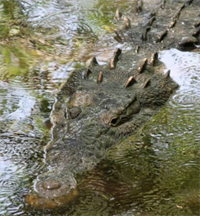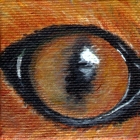 Help Us Grow!
Help Us Grow! Saving Wildlife Together - Saving the American Crocodile
Saving Wildlife Together - Saving the American CrocodileAmerican Crocodile
(go back to The Animals)

A prehistoric looking creature, it has a longer, thinner snout than the American Alligator. Growing up to 20 feet, the males in the US population rarely exceed 13 feet. Found primarily in Central America, populations exist from Atlantic to Pacific coasts with a small population in southern Florida. They prefer to live in the fresh or brackish water of river estuaries, coastal lagoons, and mangrove swamps. Their diet consists mostly of small mammals, fish, crabs, frogs, and birds. American crocodiles breed between April and May with the females laying between 30-60 eggs in a hole that take about 10 weeks to hatch. Sexual maturity occurs between 8-10 years old and the average lifespan of the crocodile is 70 years. Solitary creatures, American crocodiles spend their days basking in the sun. They do most of their hunting during the evening hours spending a lot of time submerged in water since water cools slowly. Although American crocodiles are considered endangered and are protected by the US Endangered Species Act and by the Convention on International Trade in Endangered Species internationally, which prohibits commercial trade of these animals, the main threat to them is loss of habitat due to the invasion of human development and illegal killing. Also, these protection acts are not as enforced in other countries as they are in the US which has been detrimental to the American crocodile.
American Crocodile - Fast Facts
Type: ReptileDiet: Carnivore
Average lifespan in the wild: 60 - 70 years
Size: 7 - 15 ft (2.1 - 4.6 m)
Weight: 150 to 450 lbs (68 to 204 kg)
Group name: Bask (on land) or Float (in water)
Status: ENDANGERED
Buy an American Crocodile Eye Wildlife Collectible Pin and help save the American Crocodile.


 Help
Help





 Check this out...
Check this out...
 Your Account
Your Account